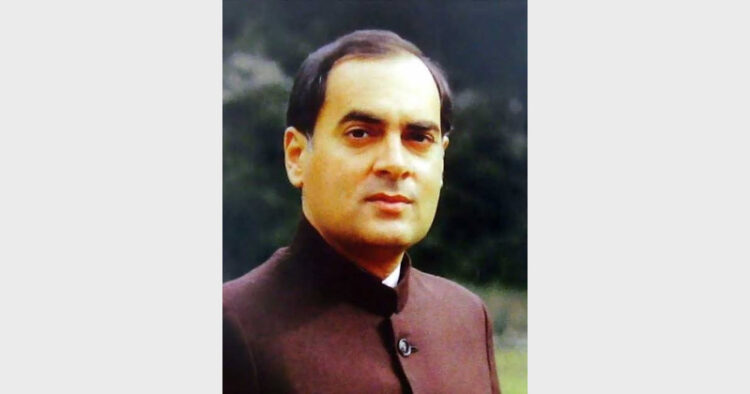New Delhi: Homage to a man who is no longer with us, but politics and a few policy mistakes of a former Prime Minister who had a massive mandate need closer scrutiny nevertheless.
Did Rajiv Gandhi really say, “hum jeetenge ya loosenge” ….. during 1991 election campaign in Faizabad ?
This was the ‘real and famous’ slip of the tongue by the Prime Minister in office who launched a campaign promising Ram Rajya. Of course this campaign (not for the Hinglish) turned out to be a grave mistake for a leader who was handed over as many as 404 Lok Sabha seats.
His famous grandfather and successful politician mother also never got such a mandate. Needless to add, the mandate in December 1984 polls came to Rajiv aftermath his mother’s assassination.
But the fact of the matter is he could not retain the ‘hold’ on both, his party and the country. The time he was voted out, though Congress was still the single largest party, the strength in Lok Sabha for Congress in 1989 came below 200.
The Congress tally came down to 195 while Janata Dal’s strength shot up to 142 and BJP got 89 seats.
And that marked the ‘end’ of the family rule in PMO since then although for a decade his wife remote-controlled the Manmohan Singh regime with a few success tales and also unprecedented gory tales about flip-flops and corruption.
There were other mistakes too. Sadly, there was a blunder of sorts in the Sri Lankan policy and that ultimately took away his life, on May 21, 1991. “…If we do not want to talk to the LTTE (Rajiv’s killers) , then we should withdraw the forces immediately,” thus came recommendation from the then IG CRPF Southern Sector, D R Kaarthikeyan.
Ironically, he later also headed the CBI’s Special Investigation Team that probed the assassination of Rajiv Gandhi.
The ‘recommendation’ to open dialogue with LTTE was rejected by the government including a senior official in the Ministry of External Affairs.
According to the book ‘Triumph of Truth: The Rajiv Gandhi Assassination. The Investigation’, Joint Secretary in charge of Sri Lankan affairs, Kuldeep Sahadev had said, “While I agree with his assessment, I do not agree with his recommendation that we should talk to the LTTE. They are undependable and you cannot rely on them again.”
The book also says that, the then Cabinet Secretary, T N Seshan had told Kaarthikeyan before his assignment to Sri Lanka (in 1989) that the Sri Lankan government told India that in pursuance of the Indo-Sri Lankan Accord, they effected the 13th Amendment to their Constitution, after which enormous powers have been delegated to the newly created North-Eastern Province with headquarters at Trincomalee.
But the LTTE and other groups contend that no devolution has taken place to the Tamil Province, despite the assurance of Rajiv Gandhi to Prabhakaran.
Other problem areas in Rajiv Gandhi’s politics came when he ‘infamously’ said – “When a big tree falls, the earth shakes”. This was almost forgiven by a tolerant India who perhaps sympathised with a grieving son.
But the Congress party which makes a big fuss about so called ‘mob lynching’ now cannot forgive itself for having committed the same ‘crime’ against the Sikhs in broad daylight on the streets of Delhi.
Then Rajiv’s blunder was to play in the hands of the radical Maulvis crowd and he ‘overturned’ a reformist verdict of the Supreme Court in the Shah Bano case.
Hindus felt annoyed and gradually started showing faith in BJP- then a two-MP rich party. The moderate Muslims too were displeased. None other than his minister Arif Mohammad Khan quit Congress.
Arif Mohammad Khan is now Kerala Governor appointed by the Narendra Modi government.
As an interesting anecdote, I can share here that it was reported that after he tendered resignation, Khan stayed away from his house.
Next morning at Parliament premises, he met among others Rajiv’s trusted friend Arun Singh, who repeatedly told him while he was correct ‘morally’ but his move would cause a lot of inconvenience to the Congress party.
It was claimed that P V Narasimha Rao had told Khan, ‘tum bahut ziddi ho. Shah Bano ne bhi apna stand badal liya hai’ (Why are you being so arrogant, now even Shah Bano has changed her stance).
Paradoxically, Arif Mohammad Khan has actually proven quite visionary as he had always said that the ‘secular parties’ blatantly playing the ‘Muslim card’ would only harm the interests of the community.
Around 1992, a year after Rajiv’s death, veteran Naga Congress leader Hokishe Sema was happy that gradually Narasimha Rao (who took over Congress and reins of governance after Rajiv’s death) was trying to build up the
Congress party at the grassroots level.
Various regional leaders in the Congress got encouragement and he told this journalist
that they were also getting ‘freedom and autonomy’ to build up the party on their own.
Hokishe had mentioned leaders like Digvijaya Singh in Madhya Pradesh and S M Krishna in Karnataka. Among others, he said another state leader would do well or was Sharad Pawar, then defence minister and
who later moved back to Maharashtra as the Chief Minister.
“I admire Rao’s style of functioning. All these state leaders are not nominated unlike Rajiv Gandhi’s stint and are getting their positions elected and on their merits. This change is refreshing,” Hokishe had said, adding “Look here, the Congress is reviving and it’s happening on ground”.














Comments